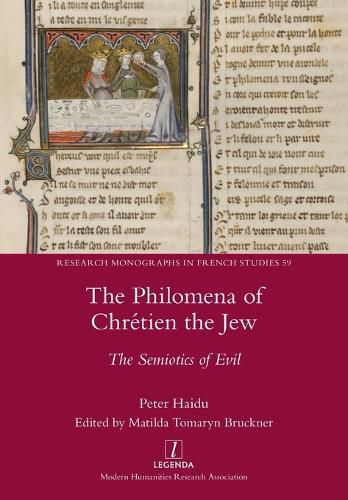Readings Newsletter
Become a Readings Member to make your shopping experience even easier.
Sign in or sign up for free!
You’re not far away from qualifying for FREE standard shipping within Australia
You’ve qualified for FREE standard shipping within Australia
The cart is loading…






This title is printed to order. This book may have been self-published. If so, we cannot guarantee the quality of the content. In the main most books will have gone through the editing process however some may not. We therefore suggest that you be aware of this before ordering this book. If in doubt check either the author or publisher’s details as we are unable to accept any returns unless they are faulty. Please contact us if you have any questions.
Ovid's gruesome tale of rape, mutilation, and revenge, transformed into Philomena and retold in French octosyllables, found its way into the fourteenth century Ovide moralise with a signature at its mid-point: Crestiens li gois, the great twelfth century romancer's early avatar. Writing two generations after the Jewish massacres of the First Crusade, Christian the Goy playfully alludes to his hybrid status as a forced convert, even as he hides his identity in order to invent - like Philomena herself - new signs, a new language to speak the unspeakable and construct a fictional universe whose universalist values offer a critique of contemporary society. Such is Peter Haidu's conjecture and argument, combining philology, history and theory to offer a political interpretation and close reading of how a young poet transposed his horror at the holocaust of 1096.
Left unpublished at his death, this summa of Peter Haidu's long and distinguished career as medievalist, literary theorist, historian, and master interpreter of Chretien de Troyes, has been edited by Matilda Tomaryn Bruckner, Professor emerita of French (Boston College).
$9.00 standard shipping within Australia
FREE standard shipping within Australia for orders over $100.00
Express & International shipping calculated at checkout
This title is printed to order. This book may have been self-published. If so, we cannot guarantee the quality of the content. In the main most books will have gone through the editing process however some may not. We therefore suggest that you be aware of this before ordering this book. If in doubt check either the author or publisher’s details as we are unable to accept any returns unless they are faulty. Please contact us if you have any questions.
Ovid's gruesome tale of rape, mutilation, and revenge, transformed into Philomena and retold in French octosyllables, found its way into the fourteenth century Ovide moralise with a signature at its mid-point: Crestiens li gois, the great twelfth century romancer's early avatar. Writing two generations after the Jewish massacres of the First Crusade, Christian the Goy playfully alludes to his hybrid status as a forced convert, even as he hides his identity in order to invent - like Philomena herself - new signs, a new language to speak the unspeakable and construct a fictional universe whose universalist values offer a critique of contemporary society. Such is Peter Haidu's conjecture and argument, combining philology, history and theory to offer a political interpretation and close reading of how a young poet transposed his horror at the holocaust of 1096.
Left unpublished at his death, this summa of Peter Haidu's long and distinguished career as medievalist, literary theorist, historian, and master interpreter of Chretien de Troyes, has been edited by Matilda Tomaryn Bruckner, Professor emerita of French (Boston College).